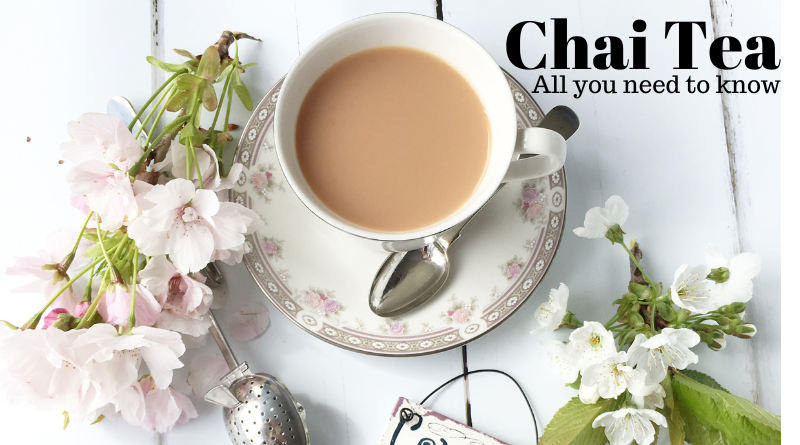Chai Tea – Does it have caffeine
Chai tea is a popular beverage enjoyed by millions of people worldwide. The warm and spicy flavors of chai tea make it a favorite choice, particularly during the cold winter months. In recent years, chai tea has gained even more popularity, with numerous cafes and tea houses offering a variety of chai tea options on their menus.
In this article, we will explore whether or not chai tea contains caffeine. We will provide an overview of what chai tea is and its ingredients, discuss the caffeine content of chai tea, and explore decaf chai tea options and how is it different from Chai Tea Latte.
What is Chai Tea
Chai tea is a type of tea that is made with spices and milk. The word “chai” means “tea” in Hindi, but when people refer to chai tea, they are typically referring to a specific type of tea that originated in India.

History and Origin of Chai Tea
Chai tea has a long and rich history that dates back thousands of years to ancient India. Originally, chai tea was made with a combination of black tea, spices, and milk, and was used as a medicinal beverage to help with digestion and other health issues. Over time, chai tea became a popular beverage throughout India and eventually spread to other parts of the world.
Ingredients Used in Chai Tea
Today, chai tea is typically made with a combination of black tea, cinnamon, ginger, cardamom, cloves, and black pepper. Some variations may also include star anise, fennel, or nutmeg. The spices are usually combined with milk and sweetener, such as honey or sugar, to create a warm and flavorful beverage that is perfect for cold weather. Overall, the unique blend of spices and tea leaves in chai tea make it a favorite among tea lovers worldwide.
How To Make Chai Tea
Ingredients
- 2 cups water
- 2 cinnamon sticks
- 1 teaspoon black peppercorns
- 1 teaspoon cardamom pods
- 1 teaspoon whole cloves
- 1-inch piece of fresh ginger, sliced
- 2 black tea bags
- 1/4 cup honey or sugar (optional)
- 2 cups milk (dairy or non-dairy)
Instructions
- In a medium saucepan, bring water to a boil over high heat.
- Add cinnamon sticks, black peppercorns, cardamom pods, whole cloves, and sliced ginger to the boiling water.
- Reduce the heat to low and simmer the spices for 10-15 minutes, until the water is infused with their flavors.
- Add the black tea bags to the pan and let them steep for 2-3 minutes, until the tea is fully brewed.
- Stir in honey or sugar (if desired) and milk, then heat the mixture over medium heat until it comes to a simmer.
- Strain the chai tea through a fine-mesh sieve or cheesecloth, then discard the spices and tea bags.
- Serve hot and enjoy!
Does Chai Tea Contain Caffeine?
Chai tea is a popular beverage that is enjoyed by many people around the world. One question that is often asked about chai tea is whether or not it contains caffeine. In this section, we will explore the caffeine content of chai tea and the factors that can affect it.
Caffeine Content in Black Tea, Green Tea, and Other Ingredients Commonly Used in Chai Tea
Black tea and green tea are both commonly used in the preparation of chai tea. Both types of tea naturally contain caffeine. However, the caffeine content of black tea is generally higher than that of green tea. The amount of caffeine in tea can vary depending on several factors, such as the type of tea leaves used, the brewing method, and the steeping time.
| Tea Type | Caffeine Content (per 8 oz.) | Calories (per 8 oz.) |
|---|---|---|
| Chai Tea | 25-50 mg | 120-180 |
| Black Tea | 25-48 mg | 2-5 |
| Green Tea | 25-29 mg | 1-2 |
| White Tea | 6-25 mg | 1-2 |
| Oolong Tea | 12-55 mg | 2-4 |
| Herbal Tea | 0 mg | 0 |
In addition to tea leaves, chai tea also typically contains spices, such as cinnamon, ginger, and cardamom. While these ingredients do not contain caffeine, they can provide an energy boost and enhance the flavor of the tea.
Average Caffeine Content in a Cup of Chai Tea
The average caffeine content in a cup of chai tea can vary widely depending on the recipe and the brewing method. According to some estimates, a cup of chai tea made with black tea can contain anywhere from 40 to 60 milligrams of caffeine. In comparison, a cup of green tea contains approximately 25 milligrams of caffeine.
Factors That Can Affect Caffeine Content in Chai Tea
Several factors can affect the caffeine content of chai tea, including the type of tea leaves used, the brewing method, and the steeping time. Using a higher quality tea or increasing the steeping time can result in a higher caffeine content. Additionally, some chai tea recipes may call for the addition of extra caffeine, such as by adding a shot of espresso or using a tea blend that has been infused with caffeine.
Chai Tea Latte Vs Chai Tea
Chai tea latte is a popular variation of the traditional Indian beverage, chai tea. While chai tea is made by brewing black tea with spices such as cinnamon, cardamom, and ginger, chai tea latte is made by mixing chai tea concentrate or powder with steamed milk and a sweetener such as honey or sugar. Chai tea latte is also sometimes called a “spiced latte” or “masala chai latte.”

One of the main differences between chai tea and chai tea latte is the presence of milk in the latter. While chai tea can be consumed on its own or with a dash of milk, chai tea latte is made with a higher proportion of milk, which gives it a creamy and frothy texture. Additionally, chai tea latte is often sweeter than traditional chai tea due to the addition of sweeteners such as honey or sugar.
Another difference between the two is the brewing method. Traditional chai tea is brewed by steeping black tea leaves and spices in hot water for several minutes, while chai tea latte is made by mixing chai tea concentrate or powder with milk and heating the mixture.
Decaf Chai Tea Options
If you love the taste of chai tea but are sensitive to caffeine, you may be wondering if there are decaf options available. Luckily, decaf chai tea is becoming increasingly popular and is widely available in most tea shops and grocery stores.
Explanation of Decaf Chai Tea
Decaf chai tea is made using a similar process as regular chai tea, but with the added step of removing caffeine from the tea leaves. There are several methods for removing caffeine from tea, including using carbon dioxide or ethyl acetate. These methods do not affect the taste of the tea, but they do remove most of the caffeine content.
Comparison of Caffeine Content
The caffeine content in decaf chai tea is significantly less than in regular chai tea. On average, a cup of decaf chai tea contains less than 5 mg of caffeine, whereas a cup of regular chai tea contains between 25 to 50 mg of caffeine, depending on the brewing method and ingredients used.
Pros and Cons of Drinking Decaf Chai Tea
Pros:
- You can enjoy the delicious taste of chai tea without the jittery effects of caffeine.
- Decaf chai tea is a good option for those who are sensitive to caffeine or who want to limit their caffeine intake.
- Decaf chai tea can be enjoyed at any time of day or night without affecting your sleep quality.
Cons:
- Decaf chai tea may not provide the same energy boost that regular chai tea can provide.
- Some people may not enjoy the taste of decaf chai tea as much as regular chai tea.
- Decaf chai tea may not be as widely available as regular chai tea.
Final Thoughts
In conclusion, chai tea is a popular beverage enjoyed by many for its unique blend of spices and rich flavor. While it does contain caffeine, the amount varies depending on the ingredients used and the brewing method. Chai tea also offers various health benefits, such as improving digestion and reducing inflammation. For those who are sensitive to caffeine or want to enjoy chai tea without the jitters, decaf options are available. Whether you prefer your chai tea hot or cold, sweetened or unsweetened, it’s a great option to consider for a flavorful and aromatic drink that also offers a host of potential health benefits.




